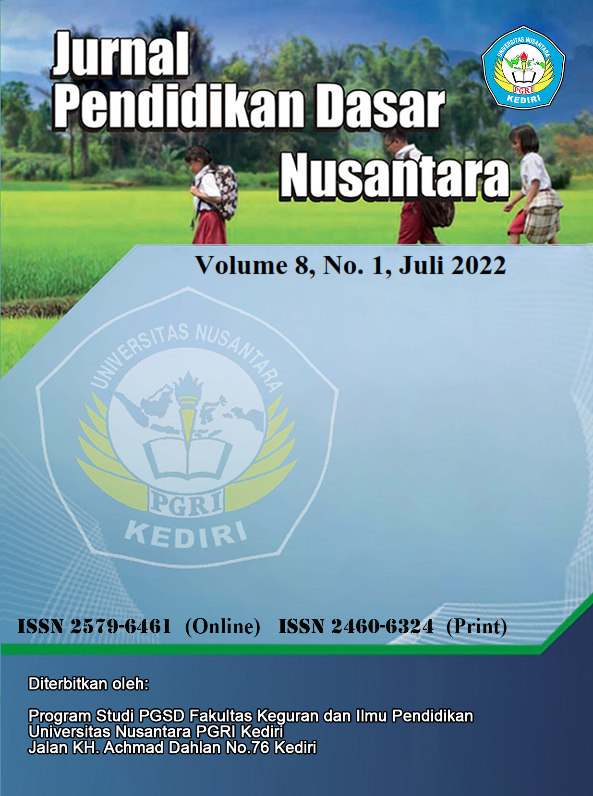THE EFFECTIVENESS OF GAME BASED LEARNING METHOD WITH PERFECT NUMBER MEDIA ON CREATIVE THINKING ABILITY OF ELEMENTARY SCHOOL STUDENTS
DOI:
https://doi.org/10.29407/jpdn.v8i1.17094Keywords:
Game-Based Learning, Perfect Number, Creative Thinking AbilityAbstract
This study aims to determine the effectiveness of Game Based Learning Method with Perfect Number Media on Creative Thinking Ability of Elementary School Students. The use of perfect number media aims to make learning more interesting and improve students' creative thinking skills. This study uses a quantitative approach to the type of experimental research. This research was conducted at SDN Jubelan 01, Sumowono District, Semarang Regency, Central Java. The population in this study were all students at SDN Jubelan 01. The research sample was grade IV students at SDN Jubelan 01. The results showed that the game-based learning method assisted by perfect number media was effective in improving students' creative thinking skills. The results of the t test show that there is a difference in the average learning value of the experimental class which is higher than the average value of the control class learning and the significance level is < 0.05, then is accepted. The results of the regression test showed that there was an effect as evidenced by the significance value of students' creative thinking ability of 0.038 where this value was less than 0.05, then the hypothesis was accepted. The results of the paired sample t-test showed a significance level of <0.05, namely 0.00 <0.05, then was accepted. The data on the value of creative thinking ability also shows that the percentage of the experimental class is greater than the control class.
Downloads
References
Aini, F.N. (2018). Pengaruh Game Based Learning Terhadao Minat dan Hasil belajar pada Mata Pelajaran Ekonomi Siswa kelas XI IPS. JUPE, 6 (3), 249-255.
Anjani, K.D., Fatchan, A. & Amirudin, A. (2016). Pengaruh Pembelajaran Berbasis Turnamen dan Games terhadap Motivasi Belajar Siswa. Jurnal Pendidikan: Teori, Penelitian, dan Pengembangan, 1(9), 1787-1790.
Arsyad, A. (2014). Media Pembelajaran.Jakarta : Raja Grafindo Presada.
Azizah Mashami, R., Andayani, Y., & Sofia B.F.D. (2014). Pengembangan Media Kartu Koloid untuk Meningkatkan Hasil belajar Siswa, Jurnal Kependidikan, 13 (4), 407-414.
De Freitas, S. (2006). Learning in Immersive worlds A review of game-based learning Prepared for themJISC e-Learning Programme. JISC ELearning Innovation, 3.3 (October 14), 73. https://doi.org/10.1111/j.1467-8535.2009.01024.x
Hidayat, R. (2018). Game Based Learning: Acasemic Games sebagai Model Penunjang pembelajaran Kewirausahaan. Buletin Psikologi, 26(2), 71-85.
Liu, E.Z.F., & Chen, P.K. (2013). The Effect of Game Based Learning on Student’s Learning-A Case of “Conveyance Go”. Procedua-Socio and Behavioral Sciences, 2013(2013), 1044-1051.
Luhsasi, D.I., & Permatasari, C.L. (2020). Trade Game Akuntansi untuk Siswa Sekolah Menengah Atas. Scholaria: Jurnal Pendidikan dan Kebudayaan, 10(1), 51-59.
Noviyanti, G.V. (2018). Pengaruh Game Based Learning terhadap Hasil belajar Mata Pelajaran Ekonomi X SMA, Jurnal Pendidikan Ekonomi JUPE), 6(2), 110-115.
Pratiwi, A.S. & Musfiroh, T. (2014) Pengembangan Media Game Digital Edukatif untuk Pembelajaran Menulis Laporan Perjalanan Siswa Sekolah Menengah Pertama. Lingtera. 1(2), 123-135.
Priyatno, Duwi. (2010). Paham Analisa Statistik Data dengan SPSS. Yogyakarta: Gava Media.
Sidarta, K.T., & Yunianta, T.N.H. (2019). Pengembangan Kartu Domano (Domino Matematika Trigono) Sebagai Media Pembelajaran pada Mata Kuliah Triginometri. Scholaria: Jurnal Pendidikan dan kebudayaan, 9(1), 62-75.
Stiller, K.D., & Schworm, S. (2019). Game Based Learning of the Strukture and Functioning of Body Cells in a Foreign language: Effect on Motivation, Cognitive Load, and Performance. Frontiers in Educarion, 4 (March), 1-19.
Sugiyono. (2010). Model Penelitian Pendidikan (pendekatan Kuantitatif, Kualitatif, dan R&D). Bandung : Alfabeta.
Sugiyono. (2015). Model Penelitian Kuantitatif, Kualitatif dan R &D. Bandung: Alfabeta.
Tarlina, W.H. & Afriansyah, E.A. (2016). Kemampuan Berpikir Kreatif Siswa Melalui Creative Problem Solving. EduMa, 5 (2): 42-51
Vusic, D., Bernik, A., & Gecek, R. (2018). Instructional Design in Game Based Learning and Applications Used in Educational Systems. Technical Journal, 1(2), 11-17.
Downloads
Published
Issue
Section
License
Authors who publish with this journal agree to the following terms:
- Copyright on any article is retained by the author(s).
- The author grants the journal, the right of first publication with the work simultaneously licensed under a Creative Commons Attribution License that allows others to share the work with an acknowledgment of the work’s authorship and initial publication in this journal.
- Authors are able to enter into separate, additional contractual arrangements for the non-exclusive distribution of the journal’s published version of the work (e.g., post it to an institutional repository or publish it in a book), with an acknowledgment of its initial publication in this journal.
- Authors are permitted and encouraged to post their work online (e.g., in institutional repositories or on their website) prior to and during the submission process, as it can lead to productive exchanges, as well as earlier and greater citation of published work.
- The article and any associated published material is distributed under the Creative Commons Attribution-ShareAlike 4.0 International License

































